#secular society
Text
The Witches
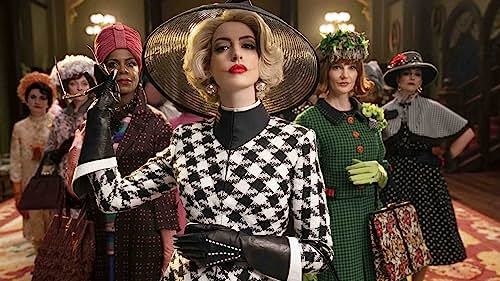
I would rarely choose to watch secular ideas of witches, except when aesthetics and comedy are the main focus.So when I saw a trailer of 'The Witches' on TV, showing the bit where the Grandma is giving her grandson the truth about such phenomena, plus how she would cough when they were near, I got very interested.When we get involved in all things Scriptural, the demonic side of this life on earth is also something to research and reference in as many Bible verses as possible.
Sure, the film is full of aesthetics, fantasy and humour, plus some rather good 1960s music. But me, I'm always on the lookout for some spirit truth. And the metaphor that can come through for those of us familiar with the epistolary style of C.S. Lewis in his clever Screwtape Letters
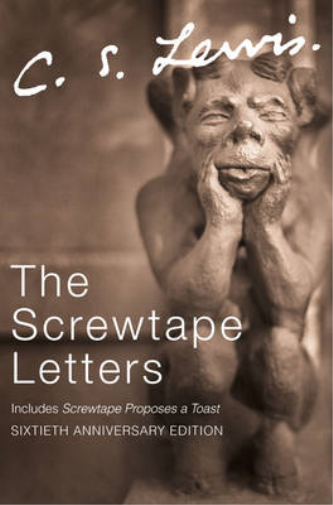
Going back to the 2020 film of 'The Witches' apparently based on Roald Dahl's book, I think to myself how frightening it must be to some children, depending on the secularity in which they live and are taught by their parents. And we do live in a society practically devoid of spiritual recognition, in terms of Scriptural precepts. Yet to show our younger generation archaic nursery rhymes and stories, which were meant to be encouraging to children to do the right thing ... for example Struwwelpeter and many other scary writings, examined in an online article named:
Burning, Starving and Maiming: Nursery Rhymes Without Happily Ever Afters
They cannot understand how such stories were told to children ... as per the conversation I had with one of my granddaughters over Christmas.
It was an opportunity to speak of understanding how history was very different to modern life, which is why we should never judge the way they lived then, with the way we live now.

0 notes
Text
No Illusion of a God to Hide Behind
Be certain that your authority and sense of peace is absolutely not arriving into your life from a god.
We live and are encouraged by a secular state not a religious one.
0 notes
Text
Unpacking the Rise of Atheism: How Science, Diversity, and Social Media are Shaping a More Secular Society
Atheism is defined as a lack of belief in a god or gods. This perspective is becoming increasingly common in many parts of the world, particularly in developed regions such as Europe, North America, and Japan. Several different factors are contributing to this trend towards a more secular society, including scientific advancements, diversity, social media, and declining credibility of religious…
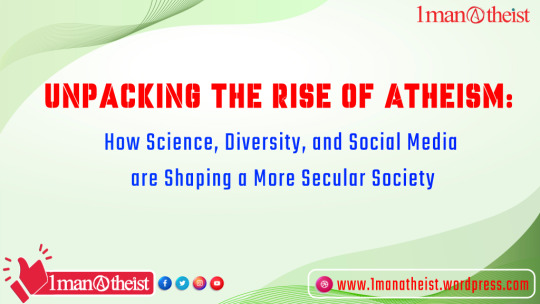
View On WordPress
#Atheism#Atheist growing in number#influence of social media in increasing no of atheism#Reasons not to believe in God#secular society#Secularism#why atheism is increasing
0 notes
Text
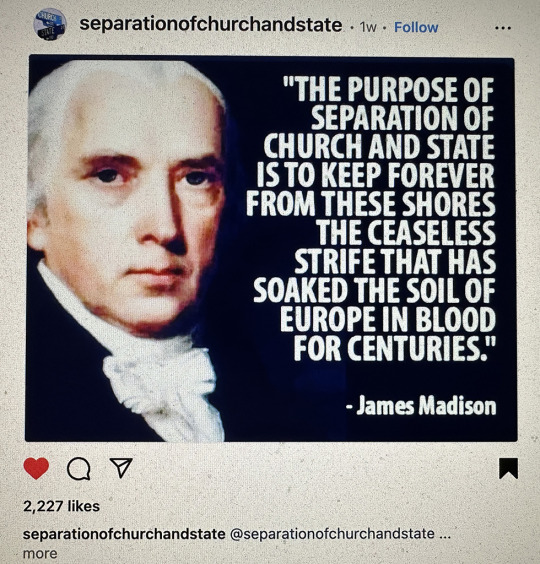
From Instagram.
1 note
·
View note
Note
Society and civil leaders advocate for liberty of conscience and inclusiveness but seem increasingly intolerant of people with opposing views. Freedom of religion to a growing number of people requires religion to follow the changing values of society. Why are ‘Christian' churches expected to demonstrate their inclusivity while nobody would ask or demand a leader of another large faith group to come out declaring a pro-homosexual stance… in fact, some football codes praising a player/s for making a stand?
Jesus is widely recognised by both those within and outside the church as a model of unconditional love, crossing cultural, gender, bodily, economic and other societal expectations and laws to embrace those often forgotten, powerless or hated. Jesus was radically inclusive, choosing unexpected people as his 12 named male disciples and other women in his regular entourage. Coming seemingly from nowhere special, Jesus was a viral sensation of his time.
Jesus also showed continued intolerance towards a certain group of people, being highly critical about certain views they held and often publicly viciously slagging/insulting them (even inventing the term hypocrite to slam them). His targeted group were various privileged and entitled sectarian religious leaders within his ‘religion’ - the Pharisees, Sadducees, other teachers of the law and the executive priests (and at times their agents). However, Jesus didn’t paint these religious leader all as one-dimensional villains, but encouraged others to emulate some of their examples, and Jesus accepted their social invitations, welcomed interactions with them and even gave them some personal blessings/miracles. But there is no hypocrisy or disconnect between Jesus being wholly inclusive and still finding the views and practices of these people offensive, especially when they impacts the rights and freedoms of others and how others view who God favours.
Beginning as a land that was first populated by the ancestors of modern Indigenous Australians, and then much later invaded/colonised by the British, who brought their colonial form of Christianity with them, contemporary Australia is now a democratic, secular, liberal and aspiring-pluralist country with laws, governance structures and expectations evolved from that British base. As such, Australia has many differences to other countries like the US, for example, Australia does not have an explicit statement protecting freedom of speech.
Think about a state school as an analogy for the state and the principal akin to the Prime Minister or a state premier. Despite the claims made sometimes by the private school sector, state schools are not value-free nor value-denying places but promote and enforce certain values based on the common laws of society and have aligned behavioural expectations of all those within their school.
Whereas most private schools have exclusionary selection of students and staff and idiosyncratic value systems depending on their main donor bases, state schools are open to all that wish to attend it (zoning pending). As a pluralist community, consideration to allow freedom for the expressions and practices of various beliefs and ideologies are usually accommodated (e.g. personal choices to pray at certain times in a private setting, clothing choices, celebration of certain festivals). Students can hold and express whatever views they wish as individuals and also practice them… but not everything is acceptable.
The freedom to express also means the freedom to disagree. You can express any views in a school but don’t always expect to have a ready audience nor be applauded. Particularly for certain individuals not used to others disagree with them, being in a pluralist community can be a difficult adjustment.
And then there are certain views and practices - especially if they are unaligned to common law - that just will not be tolerated by the leadership of the school. As such, state schools are not permissive about everything.
An example of this is with the ‘traditional misogynistic views’ often expressed by certain boys regarding sexual consent. It doesn’t matter whether those views/beliefs are rooted in long-standing sporting traditions or certain religions, in most/all state schools, they are no longer approved of nor tolerated.
Now certainly the school does not require everyone to personally believe in line with the school’s views/practices, but everyone has to acknowledge them and accommodate themselves to them. And the common values of the school are expected to be espoused and promoted by their leaders. Of course, school leaderships can and do make mistakes but these are often resolved in the court of public consensus.
Similarly, government leaders never claimed to be value-free and often are expected by the public to make comments on whether government decisions or other organisations/corporations are acting in the ‘public interest’ and consistent with expected values of modern society and laws. In fact, politicians and government leaders - such as the current prime minister and the opposition leader - are voted in precisely because of their stated values and priorities (even if they only cater to certain sectors of the Australian population). In their leadership roles, however, whatever their personal beliefs, they need to act consistent again with society’s common laws or trajectories.
The AFL and the NRL (and all other organisations) are brands focused on selling products that carries certain values. Sporting organisations have not been value-free for a long time but instead promote themselves as an all-aged unifying-society-force where all is welcomed and included (hence the public scorn for a club’s racist practices). Every paid AFL/NRL player and leader is an employee/ambassador that has to assent to the values of the corporation they choose to work for - they don't have to believe in it themselves but they have to acknowledge that is what they have signed up with. For many employees and volunteers, we often treat code of conducts or our organisation’s values statements like online account signup agreements, that is, we just want to get what they offer rather than always read what we have actually pledged our lives to, but that still doesn’t mean we can claim ignorance if we suddenly find ourselves on the wrong side of that agreement.
In our secular pluralist society, there is freedom of religion - that is, everyone is able to believe and practice whatever they want as long as it is consistent with the law of the land. Accommodations have been and continue to be made to how the legal and other system operates for certain cultural and religious groups, but as long as the overall intentions of the law are largely maintained. Allowance is also often made for conscientious objectors, that is, someone can excuse themselves from participating. These do not oppose the community, they merely step to one side to allow that community to proceed.
Because of the British base of law, Christian organisations have been traditionally favoured but increasing efforts to equalise opportunities for other religions and diverse beliefs have resulted in losses of previous exclusive privileges. Additionally, allowing others to have an equal voice in contrast to traditional bases of power, means that those claiming to speak for Christianity are increasingly finding vocal disagreement by others that previously didn’t have a voice or platform. Additionally, where secular government funding is involved, greater demands for accountability and transparency means any body that wishes to receive public funding needs to be more aligned with public expectations for their practices and who they serve. When Christian figures are questioned about what practices core to their faith are being lost (that are not related to exclusionary practices or imposing their beliefs on those outside their membership), very few specifics are given. To the privileged, equality feels like oppression.
In a pluralist secular society, all religions are not required to be pro-something that is against their core beliefs. But if a religion continues to promote certain beliefs and practices (whether core or not) that violate others’ legal rights or standing and they receive public funding/accommodations, that religion might not want to go out of their way to actively promote those practices nor expect public approval if they do. And particularly when it comes to sexual diversity, there is no universal agreement across Christianity that it is a core aspect of their faith, that is, central to the gospel of Jesus, nor has historical emphasis (unlike Christianity’s greater continuous targets against the sins of idolatry, pride, greed, inhospitality or lacking compassion for the powerless, shunned and despised).
Historically, all modern-day religions have evolved since their initial founding. The Apostle Paul would be very shocked and find the experience and life of any contemporary Australian church unfamiliar.
The God of the Bible, in fact, seems to continually push all God’s people from the first couple to the various New Testament churches, into new cultural contexts and is pleased with the evolution of expressions and practices and trajectories of inclusiveness for more and more people and practices previously shunned and condemned. In fact, until relatively more recently the Christian Church and theology were widely credited for the many victories of increasing freedoms and rights for all, especially those outside its membership. These days, society tends to view the Church as prioritising its membership and its privileges over the rights of others.
In some ways, one could say the church is returning to the also pluralist liberal days and circumstances of the New Testament society in which the Christian Church was birthed and had limited standing, influence or favour. Maybe God has ordained once again the circumstances so that God’s people can return to resembling the humility of a rural tradie’s bastard son in an urban metropolis without privilege, entitlement or institutional authority to engage once again with radical inclusiveness and proclaim the good news that God is focused and interested in people anew no matter their identity, standing, circumstances or behaviours, and whose only main intolerance is against those that deny that God wants the very best fullness of life for every single human and the rest of creation.
1 note
·
View note
Text
#judge retro alito#secular society#scotus#trumpster fire#bullshit#atheism#roe v. wade#international criticism
1 note
·
View note
Text
There’s something that has always struck me as ironic about discussions of, like, undeserved indigenous land and sovereignty in the same context as criticisms of colonial systems of property and ownership, in that the vocabulary being used fundamentally grants the premises of the system being critiqued. And it makes me wonder, in the long run, if this is the fate of a global civilization—trending gradually toward a political, material, even maybe a linguistic monoculture, on a level too fundamental to even really consciously resist, all while being dissatisfied about it but not actually being able to shape the incentives around it. Or even while loudly proclaiming that’s not what we’re doing, managing to give lip service to only the most superficial differences.
#I don’t think this is a dystopian fate or anything#just maybe an inevitable hypocrisy#like how everybody wants the benefits of a liberal secular democratic society#without having to run a liberal secular democratic society#everybody wants the benefits of participating in the emerging global monoculture#without succumbing to it#and I’m not sure that’s possible
136 notes
·
View notes
Text

There is great irony in the fact that the modern process of stamping out religion produces countless caricatures of it.
René Girard
#girard#rené girard#religion#secularism#postmodernism#christian heritage#the west#civilisation#society#spiritual#mimetic theory#french#philosopher
98 notes
·
View notes
Text
instagram
The "Muslim Brotherhood plan for the Destruction of the United States" is succeeding more quickly and brilliantly than even the Islamists from the Middle East could have imagined. The plan is 33 years old, so they are only 1/3rd the way into their plan and they've already achieved a dramatic amount of t of destruction and chaos. Look at the pro Hamas (pro Islamic terrorist) demonstrations across the country, and in hundreds of universities. Look at the division and normalized hate against the United States, against the Jews and against Israel.
#israel#secular-jew#jewish#judaism#israeli#jerusalem#diaspora#secular jew#secularjew#islam#plan to destroy america#muslim brotherhood#Islamists#Islamic jihad#ISNA#Islamic society of North America#CAIR#shahid#martyrdom#martyr#Hamas#hamas war crimes#Instagram
13 notes
·
View notes
Text
you’re thinking about how easily massive numbers of the wildly antisemitic tankies would have been pulled into the actual political tenets of (esp early to mid 20th century) armed Zionism and you’re laughing?????
#This folks is why analysis of ideology and the structures of an ideology is important#Rather than just random ass ethnic signposting#A lot of people see Zionism as something suspicious and jewy that had to do with Jews - I don’t like them#But the reality of Zionism as an initially distinctly leftist branch of political ideology that sought to liberate an oppressed people#With that tiny niggly wiggly issue of the fact people might#Already have lived on that land???? Ohhhh boy#All these cottage core back to the land the world would be better if I could reject modernity and return to the ancient ways of Farming#Society is broken it cannot be fixed the only option is to found a New Tough society that will fix all our previous problems#And we’ll get round to it in heavily armed leftist commune farming settlements#Which we will defend with violence because any violence in the name of an oppressed people is justified and our legitimacy comes from the#Rifle!!!#The only reason you see this ideology as inherently removed and bizarre is antisemitism and the only reason you see yourself removed from i#Also antisemitism!!!#You would have done numbers in ahdut ha-avoda you would have called Ben gurion abbaleh/#Remember: a bunch of the people who got sucked into this of ideology weren’t the *rich Republican aipac Jews*!*’ your head#They were broke often very secular Jewish leftists working dead end gig economy jobs in farms and sweatshops for whom the idea of a Brave#New World with a. Brave new culture was very appealing and liberating#It offered something new to the broken.#It’s important to talk about this stuff to talk about how it can be undone#But also. The world is not divided into the Oppressed and the Unoppressed#Your political ideology does not stop you from hurting others#No political ideology even anti capitalism or leftism is innately pure- all can harm others#No ethnic and cultural identity no matter how oppressed is free from the potential to subjugate others#No identity or ideology is greater than the right of other people to live freely#Cycles of oppression and the pyramid structure of many empires result in oppressed people harming other oppressed people#Many many goyim think that they’re removed from the logic of Zionism because they aren’t Jews because it’s something wierd and jewy#But I see a lot of the most destructive logics parroted by leftists every day
22 notes
·
View notes
Text
Zionists will go “even Saudi Arabia and the UAE don’t support Hamas!” As if that is not telling on yourself. You are admitting you know nothing about the entire region. Your racist generalisations are not your downfall, the lies you are trying to support with no understanding of the genocide are.
#clownery#incredibly disappointing#it’s not even GOOD lies it’s EASILY VERIFIED lies#you can’t claim there are no Palestinian Jews or that a free Palestine would include no Jews and expect me not to believe you are racist#there is no way you can think yourself educated on the topic and say things like that#it’s wilful ignorance and lies#Palestine#‘these Muslim countries say Islam doesn’t allow support of Hamas!’ and then it’s. all the friends of the US. like ...WOW. stunning.#‘these Islamic societies condemn Hamas!’ and how many Jewish societies support Israel? you are not making any point here.#there’s no way people are falling for this#it’s like saying Hamas is the real threat to Palestinians while Israel actively tries to kill/expel all of them via excessive carpetbombing#why do Zionists tell others to read up when they clearly haven’t themselves#it’s like proving your concern isn’t the civilian populations anyway and you care more about active colonisers than those being colonized#you can’t be pro secularism and then believe a genocidal ethnostate has the ‘right to exist’#or that countries represent their religions flawlessly. and for the sake of making a point with no evidence from the actual religion ???
19 notes
·
View notes
Text
gonna try not to go on and on because i have other things i told myself i'd work on this morning but it truly is such a strange experience seeing how much of like...online/popular discourse about morality echoes conservative religion. like. idk man maybe it's the perspective of having been raised in a conservative religious environment that was very centered around stuff like guilt and control and then growing older and losing that religion and separating myself from that environment but. it's just crazy to me how much supposedly "woke" or "progressive" rhetoric is almost indistinguishable from the conservative christian rhetoric i was raised with at its core. like:
idea that "sin"/perceived bad actions means a person is fundamentally "sinful"/evil/bad
idea that consuming any "sinful"/bad/"problematic" media/literature/art makes YOU a bad person
using morally weighted labels to discourage critical thought or nuance. like. if something is labeled Evil by the Group then you must accept it as Evil. if something is labeled as Good by the Group then you must accept it as good
emphasis on punishment + guilt!! if you fuck up you must Get On Your Knees and Repent
there's definitely more to be said but...yeah! idk it's just kind of scary to me that if you replace the word "problematic" with the word "sinful" a lot of the rhetoric i see coming from ostensibly progressive circles could literally be something i'd hear sitting in the pews of my old church lol
#strange that as we become a more secular society we continue to cling to like#these extreme moral undergirdings#ranting and raving#txt
83 notes
·
View notes
Text
By: Helen Pluckrose
Published: May 2, 2023
Yesterday, I wrote about whether or not liberalism has failed or whether we are failing to do liberalism. My contention is that it is the latter. No political/ethical/social/economic philosophy can work if we don’t use it. Currently, there simply aren’t enough people consistently defending freedom of belief and speech, opposing the evaluation of individuals by their race, sex or other immutable characteristics and taking an evidence-based reformist (rather than revolutionary or reactionary) approach to social progress for liberalism to work, either in law or in culture. This seems to be due to many liberals having forgotten how to do this consistently and everybody else not wanting to do it in the first place.
This piece is a continuation of this theme by looking at the question of whether liberalism is the best way to defeat Critical Social Justice (CSJ): AKA wokeism. People raise this very reasonable question with me often. I recently had a very angry American gentleman appear randomly on an Instagram post of mine to ask if I will ever have the honesty to admit that I was 100% wrong to urge Americans liberals not to vote for Donald Trump. After reminding me of my own claim that the liberal left is needed to push back the Critical Social Justice left and then informing me of President Biden’s complicity in the promotion of “gender ideology” and “CRT malarkey” he concludes: “When are you going to admit you were wrong and those on the "extreme alt-right" (but really just normal people who are not stupid) were correct about where this would all go?” He then either blocked me or Instagram blocked him so I was unable to reply. I would have said:
I am not in the habit of calling normal people who are not stupid “the extreme alt-right.” Nor would I put conservatives more generally into this category. I particularly respect liberal conservatives trying to address illiberalism on the right. (Well done on the liberal trajectory towards acceptance of same-sex marriage). Nor do I at all deny that a right-wing party would be less tolerant of Critical Social Justice than a left-wing one. This is because CSJ is an illiberal movement on the left. I have been very open in my criticism of this movement and about this being what liberals on the left currently need to work against particularly strongly when a left-wing party is in power. In the same way, liberals on the right have to address illiberalism in their parties particularly strongly when they are in power.
This is why I can be completely honest and say I still think the GOP is “not the solution for anyone who values science and reason and wants to protect a liberal society that defends freedom of belief and speech and viewpoint diversity as well as rigorous scholarship and consistently ethical activism for genuine racial, gender & LGBT equality.” If that wasn’t what you wanted to protect, I was not addressing you. If it was, then we can oppose authoritarian Critical Social Justice together as a legitimate impediment to it, but do pay attention to all the book banning and conspiracy theorizing coming from the right. For me, all the women who no longer have access to abortion & could die due to actions driven by the Republican party when it wasn’t even in power stand out. If you can avoid being a single issue thinker, you might see why somebody could be unconvinced that the GOP is the party more committed to liberal principles right now, even if you still disagree with them.
Single issue thinking is simply not compatible with liberalism. Even an authoritarian wants to protect the freedom of people who agree with them. Unfortunately, it is quite easy for a liberal to become an authoritarian. As the political scientist, Karen Stenner argues and demonstrates in her 2005 book, The Authoritarian Dynamic, authoritarianism is not a stable personality trait but can arise in response to a perceived threat. When we feel ourselves to be secure, humans are most tolerant of difference. When we feel ourselves to be in danger, we are the least tolerant. Jonathan Haidt, discussing authoritarianism in relation to nations and drawing on Stenner’s work says:
Countries seem to move in two directions, along two axes: first, as they industrialize, they move away from “traditional values” in which religion, ritual, and deference to authorities are important, and toward “secular rational” values that are more open to change, progress, and social engineering based on rational considerations. Second, as they grow wealthier and more citizens move into the service sector, nations move away from “survival values” emphasizing the economic and physical security found in one’s family, tribe, and other parochial groups, toward “self-expression” or “emancipative values” that emphasize individual rights and protections—not just for oneself, but as a matter of principle, for everyone.
We have many examples of this phenomenon historically when a relatively stable community faces a threat and responds by becoming intolerant of difference. There is no rational reason at all why the arrival of the Black Death in Europe should have resulted in mass persecution of Jews, but it did. “Survival values” came to the fore during a disaster and intensified in-group bias and out-group hostility even though the out-group was not at all responsible for the disaster? On an individual level, this can take the form of ‘radicalisation’ in which the individual is worked upon to induce a sense of fear and danger from, again, an out-group, which can result in dehumanisation and violence.
It is this switch that can be flipped from emancipative (liberal) values to survival values that can make a liberal an authoritarian and I would suggest that ‘single issue thinking’ can also have this effect. Those of us who focus intensely on one kind of cultural problem need to be particularly careful not to flip this switch in ourselves. It is all too easy for somebody who begins studying a particular cultural issue and starts out with liberal principles which they try to apply consistently to become increasingly anxious and convinced that this is the one big threat to society until they are no longer guided by their principles but determined only to defeat this one thing. This phenomenon is often seen in online political commentators and described with the phrase “If you stare too long into the abyss, the abyss stares back at you.”
Today, one of my readers ( a much more thoughtful Dutchman)* commented on the last essay saying that he thought it was a fair empirical question to ask whether liberalism is the most effective way to combat CSJ. I think he is quite right. However, I would quibble a little and say that the exchange of just one word would produce different answers in my mind.
Is liberalism is the most effective way to combat CSJ?
Probably not, no.
Is liberalism the best way to combat CSJ?
Yes, absolutely. It’s essential.
It depends very much on what your primary aim is. If the primary aim is to get rid of CSJ, then pushing it out with another popular illiberal belief system could well be more effective than trying to get a consensus on the 'live and let live' approach of liberalism. If your primary aim is to live in a liberal society I do not see any other way to achieve that than liberalism.
There really are only two ways to deal with any authoritarian movement that has power and prestige in society.
Become more strongly liberal and fully & consistently insist upon people's rights to hold and express their own views and not to have others' imposed on them
Put our strength behind whichever authoritarian belief system we dislike least that also has the potential to squash out the ones we dislike most.
While belief systems vary widely, any that gains the cultural power to make the social rules will ultimately either allow people freedom of belief and speech or it won't. If you have to pretend to hold certain political, religious or philosophical views or pretend not to hold the ones you do hold to avoid material harm to your person or livelihood, it is authoritarian. If you are being “held accountable” to anybody else’s religion, politics or philosophy, rather than just reasonable laws and responsibilities of citizenship that apply to everyone, it it is authoritarian.
Yesterday, I said I will not do the Ibram X. Kendi style argument about liberalism: “You can either be liberal or illiberal. There is no such thing as ‘non-liberal.’ When speaking of a worldview that someone holds it can certainly be non-liberal if it does not share the foundational principles of philosophical liberalism but is not authoritarian in that it does not seek to impose any views on or ban any views of other people. I do not intend to tell anyone who is not an authoritarian that they are a philosophical liberal. They could, for example, be a conservative Christian who does not wish to force anybody else to be one. In this case, their own worldview is not liberal, but their attitude towards the religious freedoms of others is.
When it comes to wielding power to make the social rules and penalise dissent, this really can only go one way or the other depending on whether it does penalise dissent or not. There is no such thing as ‘a little bit authoritarian’ or ‘partial freedom of speech.’ Whenever somebody says “I support freedom of speech but…” followed by something that forbids the expression of certain ideas or justifies penalising people for expressing them, they would do better to say that they believe protecting people from certain ideas is more important than freedom of speech. This is a coherent and arguable ethical position. It is just not a liberal one.
I am belabouring this point because it is central to understanding the significance of the question “Is liberalism the best way to defeat wokeness?” The answer to this comes down to whether you see liberalism as a tool to defang a specific ideology or as an end goal in itself.
Take our hypothetical conservative Christian again and put him in a predominantly Muslim country. It is in his interests then to strive for a liberal government and culture as this will enable him freedom of religion. But is it in his principles? We can find out if we move him to a predominantly Christian country. If he still defends freedom of religion even though it now benefits people who are not him and believe things he must think are wrong, it seems very likely that he sees a liberal society as an end goal in itself. If he does not defend freedom of religion but supports or condones authoritarian Christianity, it is very likely he was using liberalism as a tool in a specific situation and his end goal is primarily a Christian society. Again, this is a coherent and arguable ethical position if he believes Christianity to be better for society than freedom of belief. Again, it is not a liberal one.
It is important to be clear about whether you consider liberalism to be your end goal or whether it is a tool in your arsenal for reaching a different end goal. My impression is discussion is that a significant number of people are not clear about this. If you are somebody who considers yourself liberal and opposes the Critical Social Justice movement and its authoritarianism, do you primarily oppose CSJ or authoritarianism? Do you consistently oppose authoritarianism and consider CSJ to be a current, powerful example of it? Or is your primary goal defanging CSJ specifically so that you might consider a range of options including giving an alternative ideology equivalent power to make the social rules and impose them on people?
Of course, practical reality is not so black and white as this, however principled we may be and however committed to liberalism as an end goal. As discussed above, liberals are quite often forced into a ‘lesser of two evils’ position when it comes to voting when neither party is being particularly liberal and the only alternative is not voting at all. Many seem to feel that we are in a similar position now with cultural movements and that it has come to a ‘lesser of two evils’ choice from which, if obtained, it could be easier to work towards liberalism as an end goal. I see their point but I am holding out and would encourage everybody to hold out. I have been accused by a good friend of taking this to an extreme, but I am pretty sure that I would become authoritarian before it came to the situation he describes. Maybe.

==
Liberalism is what we should be doing anyway. Wokeness or not.
#Helen Pluckrose#liberalism#illiberalism#liberal values#liberal ethics#epistemology#secular values#secularism#critical social justice#social justice#woke#wokeism#cult of woke#wokeness#wokeness as religion#religion is a mental illness#woke authoritarianism#liberal society
23 notes
·
View notes
Text
Nietzche, Jung, Campbell. The trifecta of trying to find something outside of chrsitianity and ending up reaffirming your original christian values
#im watching mma fighter interviews and some of these guys are clearly well read but like man#its just funny idk Nietzche was rlly meaningful to me because he saw a need to recognise and organise society without#the need for christianity to be the guiding light for humanity#but Jung and Campbell fucking loved perennialism they tried to flatten culture into just christianity again#they just dress it in secular frameworks but they reaffirm their core beliefs thatre societally held#whacky
4 notes
·
View notes
Text
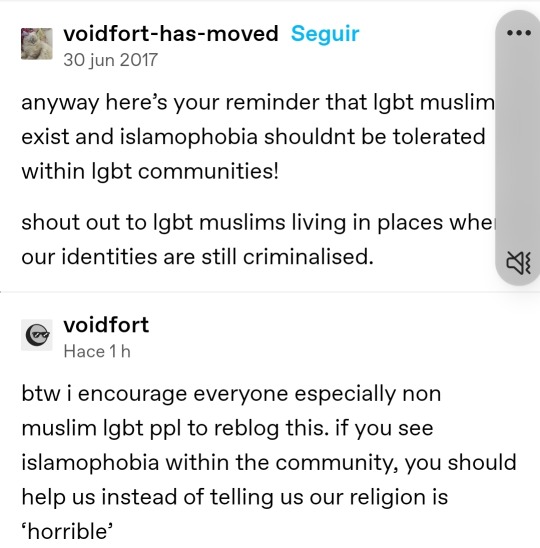
Friend, your religion is the reason why LGBT Muslims are oppressed in Muslim-majority countries. It's not 'islamophobia', religion, all religions, MUST be criticized and torn apart, it's anti-arab racism that's the problem.
#religion#radical atheist hours#sure ppl sometimes criticize your religion in a racist way#that's not fair and there are liberal muslims#but liberal muslims' defense and refusal to criticize islam#does not help the muslims in Muslim-majority countries who desperately need to live in more secular societies bc religion is crushing them#this applies to every ultra religious community btw from american christofascists to ultra-orthodox jews
10 notes
·
View notes
Text
hamlet, heinrich faust, and dr. henry jekyll make up the trio of characters that fall into the category of, "you're absolutely NOT meant to be seen as jewish in the source material, but there's something that adds a lot of interesting thematic stuff to toy around with if i made you jewish in my retelling and personal interpretation".
#personal#also all three have distinctly different relationships with their judaism#hamlet and jekyll would likely be categorized as more reform/conservative jewish today#since they adhered to a lot of religious practices#but not every single one#while faust is more one of those upper-class type secular german jews from the 19th century#and yet: his being jewish 100% impacts his place in society#even if he's not religiously observant#tl;dr hamlet's story arc is more about a very personal struggle with his faith regarding his childhood trauma#and dr. jekyll and faust are trying to deal with their status as outsiders both to antisemitic gentile society#tolerated. but not appreciated
3 notes
·
View notes